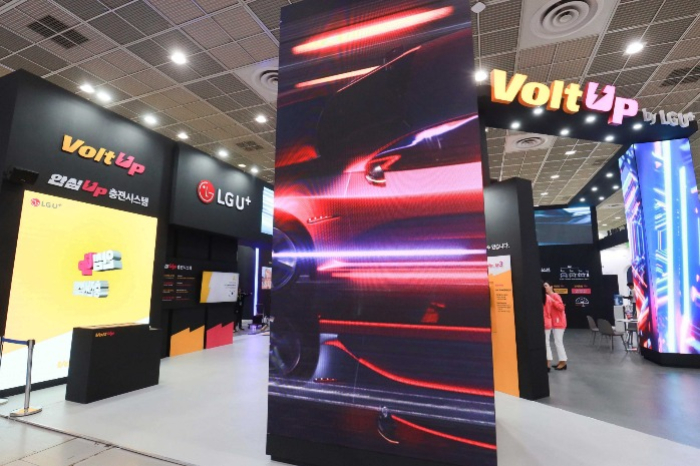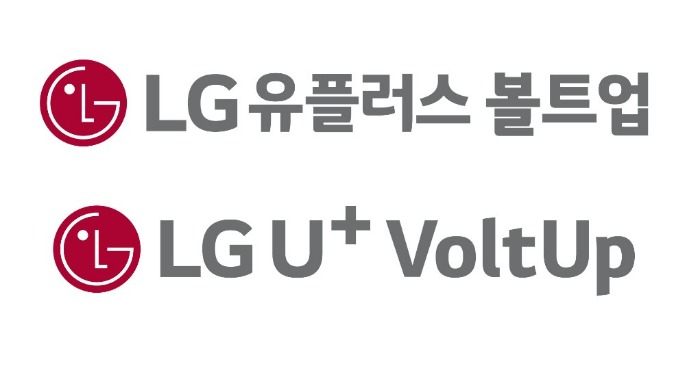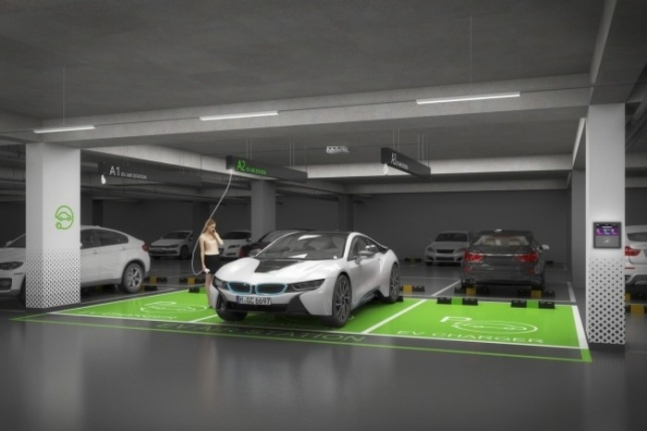LG-Kakao EV charger JV LG Uplus VoltUp sets sail
The joint venture will advance into the commercial building EV charging market with a tiered pricing model
By Jun 05, 2024 (Gmt+09:00)
When in S. Korea, it’s a ritual: Foreigners make stops at CU, GS25, 7-Eleven


Maybe Happy Ending: A robot love story that rewrote Broadway playbook


NPS yet to schedule external manager selection; PE firms’ fundraising woes deepen


Seoul appeal: Korean art captivates Indonesia’s affluent connoisseurs


K-pop stocks surge as China set to loosen cultural ban after 9 years



LG Uplus Corp., South Korea’s third-largest mobile carrier, and the country’s largest taxi-hailing platform Kakao Mobility Corp. officially launched their electric vehicle charging system joint venture on Wednesday, heralding fiercer competition in the country’s burgeoning, but fragmented, EV charging market.
The joint venture, dubbed LG Uplus VoltUp, will be led by Chief Executive Officer Hyun Jun-yong, former vice president of EV Charging Business at LG Uplus.
While LG Uplus will focus on the management and operation of the JV, Kakao Mobility will be in charge of strategy and technology development with its know-how in building and operating a Mobility-as-a-Service platform and related infrastructure, according to Kakao Mobility.
Approved by the Fair Trade Commission (FTC) in April, LG Uplus will hold 50% of the JV plus one share, while Kakao Mobility will control 50%. Each company has pledged to chip in 25 billion won to set up the JV.

The JV will be placed under LG Uplus as a subsidiary and take over LG Uplus’ existing charging service operation, which controlled a mere 1.1% share in the Korean EV charging market as of July last year.
A GAME CHANGER
The new player in the Korean EV charging market will continue operating about 10,000 chargers already installed and operated by LG Uplus in apartment buildings in Korea while seeking to build more EV charging infrastructure for commercial buildings, the company said.
It plans to offer tailored charging prices for different customers to differentiate its service from competitors.
The JV hopes to lead Korea’s EV charging market, which is in its fledgling stages without dominant players, with new services that meet users’ demands, Hyun said in a statement.
The Korean EV charging market was vied for by more than 100 companies operating 250,000 charger units together across the country as of September last year, according to South Korea’s Ministry of Environment.

Korean major conglomerates GS and SK groups are two notable big players in the country’s EV charging market, while Naver Corp., the country’s largest online portal operator, is also seeking to crack the market.
LG Uplus first entered the EV charging market in 2021 with its expertise in operating nationwide mobile phone base stations and data centers.
In June last year, it decided to team up with Kakao Mobility to expand its business and improve its charging service.
Three months later, it unveiled a ceiling-type multi-charging system jointly developed with the construction arm of Hanwha Corp. and two local startups – EV charger manufacturer GENIS Korea and EV charger designer Zipool Engineering.
LG Uplus aims to join the ranks of the top three Korean EV charger makers by 2026.
Write to Kang-Ho Jang at callme@hankyung.com
Sookyung Seo edited this article.
-
 Electric vehiclesKakao joins hands with LG Uplus to enter EV charger market
Electric vehiclesKakao joins hands with LG Uplus to enter EV charger marketApr 29, 2024 (Gmt+09:00)
1 Min read -
 Electric vehiclesLG Elec to venture into US EV charger market in 2024
Electric vehiclesLG Elec to venture into US EV charger market in 2024Nov 16, 2023 (Gmt+09:00)
1 Min read -
 Electric vehiclesMobile carrier LG Uplus makes inroads into EV charger market
Electric vehiclesMobile carrier LG Uplus makes inroads into EV charger marketOct 24, 2023 (Gmt+09:00)
2 Min read -
 BatteriesLG Uplus, Hanwha unveil ceiling-mounted EV charging system
BatteriesLG Uplus, Hanwha unveil ceiling-mounted EV charging systemSep 25, 2023 (Gmt+09:00)
1 Min read -
 Electric vehiclesLG Uplus, Kakao Mobility to form EV charging JV
Electric vehiclesLG Uplus, Kakao Mobility to form EV charging JVJul 03, 2023 (Gmt+09:00)
1 Min read


